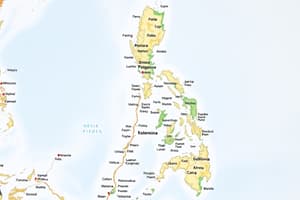Podcast
Questions and Answers
What is the primary function of trade unions in a country?
What is the primary function of trade unions in a country?
- To promote the growth of corporations
- To engage in policy-making
- To protect the well-being of workers (correct)
- To provide financial assistance to projects
What type of organization provides financial assistance to important projects?
What type of organization provides financial assistance to important projects?
- Transnational advocacy groups
- Civil organizations
- Development agencies (correct)
- Cooperatives
What is the benefit of owning bonds in a corporation?
What is the benefit of owning bonds in a corporation?
- Provides loans to people
- Allows one to earn interest (correct)
- Protects owners from debt
- Determines level of ownership
What is the purpose of civil organizations?
What is the purpose of civil organizations?
What is the main goal of transnational advocacy groups?
What is the main goal of transnational advocacy groups?
What type of organization is composed of people with common interests?
What type of organization is composed of people with common interests?
What is the main characteristic of a command economy?
What is the main characteristic of a command economy?
What is the main function of the Armed Forces of the Philippines (AFP)?
What is the main function of the Armed Forces of the Philippines (AFP)?
What is the primary role of the Department of Education (DepEd)?
What is the primary role of the Department of Education (DepEd)?
What is the main difference between state and non-state banks?
What is the main difference between state and non-state banks?
What is the primary role of corporations in non-state banks?
What is the primary role of corporations in non-state banks?
What is the main characteristic of a corporation?
What is the main characteristic of a corporation?
Flashcards
Trade Unions
Trade Unions
Organizations that represent workers' interests and advocate for better wages, working conditions, and benefits.
Development Banks
Development Banks
Financial institutions that provide financial assistance for projects in areas like infrastructure, energy, and agriculture.
Bonds
Bonds
A type of investment that provides a fixed rate of return for a specific period of time, typically considered less risky than stocks.
Civil Organizations
Civil Organizations
Signup and view all the flashcards
Transnational Advocacy Groups
Transnational Advocacy Groups
Signup and view all the flashcards
Associations
Associations
Signup and view all the flashcards
Command Economy
Command Economy
Signup and view all the flashcards
Armed Forces of the Philippines (AFP)
Armed Forces of the Philippines (AFP)
Signup and view all the flashcards
Department of Education (DepEd)
Department of Education (DepEd)
Signup and view all the flashcards
State Banks
State Banks
Signup and view all the flashcards
Non-state Banks
Non-state Banks
Signup and view all the flashcards
Corporations
Corporations
Signup and view all the flashcards
Study Notes
Trade Unions
- Represent workers' interests and advocate for better wages, working conditions, and benefits.
- Negotiate collective bargaining agreements with employers.
- Promote workers' rights and provide support during disputes.
Financial Institutions
- Financial institutions like development banks provide financial assistance for projects in areas like infrastructure, energy, and agriculture.
Bonds in Corporations
- Investing in bonds provides a fixed rate of return for a specific period of time and is typically considered less risky than stocks.
Civil Organizations
- Promote social change, address community needs, and provide services to various groups.
- Examples include charities, non-profit organizations, and advocacy groups.
Transnational Advocacy Groups
- Aim to influence policy and promote social change on an international scale.
- Advocate for issues like human rights, environmental protection, and global development.
Organizations with Common Interests
- Associations are organizations composed of individuals with shared interests like professional groups or alumni associations.
Command Economy
- The government centrally plans and controls the economy, including production, distribution, and pricing.
Armed Forces of the Philippines (AFP)
- Responsible for protecting the country's sovereignty, national security, and territorial integrity.
- The AFP is also deployed for disaster relief and humanitarian aid efforts.
Department of Education (DepEd)
- Responsible for providing quality basic education to all Filipino children.
- Establishes policies, standards, curriculum, and programs for public and private schools.
State and Non-State Banks
- State banks are owned and operated by the government, while non-state banks are privately owned.
- State banks typically focus on providing essential financial services and supporting national development priorities.
Corporations in Non-State Banks
- Corporations play a significant role by investing in non-state banks, contributing to their capital base, and enabling them to offer a wider range of financial services.
Corporations
- Corporations are legal entities separate from their owners with limited liability and perpetual existence.
Studying That Suits You
Use AI to generate personalized quizzes and flashcards to suit your learning preferences.
Description
Learn about the differences between communist and democratic systems, including their economic structures and roles of government and private entities. This quiz covers state institutions, such as the Armed Forces of the Philippines, and their functions.




